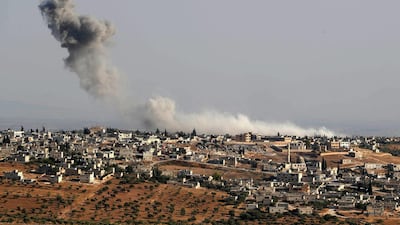Air strikes have killed more than two dozen civilians in north-western Syria in the past two days as Russian-backed forces escalated an offensive against the last major rebel stronghold, a war monitor and local activists said on Saturday.
An air strike in the village of Deir Al Sharqi killed seven members of one family, most of them children, on Saturday, the Britain-based Syrian Observatory for Human Rights said. Another seven people were killed by bombardments in other areas, it said.
On Friday, air strikes in the village of Al Haas killed 13 people. The dead included a pregnant woman and her unborn baby, local activists and the Observatory said. They had been seeking shelter after fleeing another area.
The bombardment forced a wave of people to flee northwards from the targeted areas, the Observatory and local activists said.
“They are bombing the towns and their outskirts to push people to flee,” the Observatory Director Rami Abdulrahman said. Hundreds of families had been uprooted from areas that had so far largely been spared in the almost four-month offensive he said.
The Syrian state news agency SANA said the army was continuing operations against “the terrorist organisations in rural Idlib” and had widened its area of control around the rebel-held town of Khan Sheikhoun, currently a focal point of the offensive.
Russia and Syria have said their forces are not targeting civilians but militants including Syria’s former Al Qaeda affiliate Hayat Tahrir Al Sham.
Ahmad Al Dbis, safety and security manager for the US-based Union of Medical Care and Relief Organisations, which supports medical facilities in the north-west, said the bombardment had widened into populated areas where there were no military positions.
“They are being targeted to drive the people towards forced displacement,” he told Reuters.
The UN Office for the Coordination of Humanitarian Affairs said more than 500 civilians have died in hostilities over the past three-and-a-half months. Mark Cutts, Deputy Regional Humanitarian Coordinator for the Syria Crisis, highlighted the rise in killings of humanitarian workers in the “relentless campaign of airstrikes” by the Government and its allies.
“They dig people out from under the rubble, rush wounded civilians to hospital, provide medical services and help those fleeing the area,” Mr Cutts said. “But no one is safe.”
On Wednesday, a paramedic, an ambulance driver and a rescue worker were killed in a series of air strikes on the Ma’arat Humeh area of southern Idlib.
The British minister for the Middle East, Andrew Murrison, commended the bravery of those putting their lives at risk to help others in Syria and called for an end to the regime’s attacks on civilians.
“We must see an end to this wilful disregard for civilian life – we call on the Assad regime and their Russian backers to adhere to their commitments under international humanitarian law,” he said.
Syria’s northwestern region, which includes Idlib province, is part of the last major foothold of the opposition to President Bashar Al Assad.
The government advance towards Khan Sheikhoun threatens to encircle the last remaining pocket of rebel-held territory in neighbouring Hama province.
Captain Naji Musafa, a spokesman for the rebel National Liberation Front, said fierce clashes were raging in the southern part of Idlib province and adjoining areas of Hama province.
France called on Friday for an immediate end to the fighting and in particular condemned air strikes on camps for the displaced.
The surge in violence has already forced hundreds of thousands of people to flee towards the border with Turkey, which backs some of the rebels in the north-west and has its own troops on the ground in the area.
The National Army, a Turkish-backed Syrian rebel force based north of the city of Aleppo, said technical problems had prevented it sending reinforcements to help the Idlib rebels, as it had promised on Friday.
A buffer zone deal brokered by Russia and Turkey last year was supposed to protect the Idlib region’s three million inhabitants from an all-out regime offensive, but it was never fully implemented.

